Archie Cairns: a tribute
By Fraser Clark
Editor’s note: On April 1, 2016, Major Archie Cairns, recipient of the Order of Military Merit (MMM) and Canadian Forces Decoration for 12 years’ service (CD) four times over, died at the age of 87. Cairns’s contributions to piping and drumming were significant, and one of his prize-winning pupils, Fraser Clark, a captain in the Canadian Forces, kindly stepped up with this recollection of and tribute to his mentor and friend.
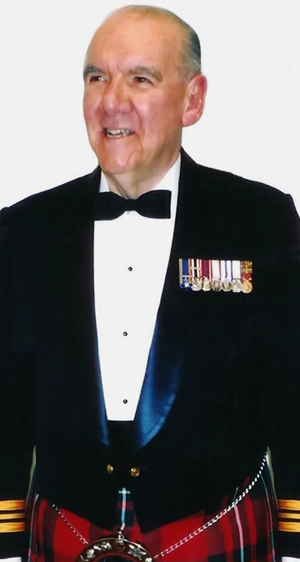 If the late Gordon Highlanders Pipe-Major George Stewart MacLennan is sometimes compared classical composer George Friedrich Handel for his natural gifts in composition, then the pipe band community lost the J.S. Bach of the bagpipes this past week. The death of Archie Cairns marks a milestone in the history of piping not only here in Canada but also in the greater global music community.
If the late Gordon Highlanders Pipe-Major George Stewart MacLennan is sometimes compared classical composer George Friedrich Handel for his natural gifts in composition, then the pipe band community lost the J.S. Bach of the bagpipes this past week. The death of Archie Cairns marks a milestone in the history of piping not only here in Canada but also in the greater global music community.
Archie’s genius was universally acknowledged and often overlooked, yet less widely known was Archie the Man, the Musician, and the Soldier. He became an unequalled resource of infinite depth whose talents were perhaps more greatly appreciated outside his native Ontario in the last quarter century than we in central Canada may care to acknowledge today.
Archie’s departure almost certainly marks the end of a generation of musicians who could draw a direct line to an era of early 20th century piping and drumming where the open double-stroke five-pace roll ruled the roost and where piping and drumming adjudicators – everywhere – notoriously gulped the grog at the games prior to rendering questionable judgments in all manner of sobriety. Archie was there and saw it all.
In his own way, Archie was a Canadian nationalist who self-identified with the Canadian Armed Forces until the day he died. Even his obituary highlights his rank: Major. But how could it be otherwise? He was born and raised into the Canadian Army, its regimental identity, and was its unwavering champion right up to the end.
Archie’s identification came by way of two streams: heredity and through the blood of his father’s experiences on the battlefields of the First World War. His father, Pipe-Major John Knox Cairns of the Argyll & Sutherland Highlanders of Canada (Princess Louise’s), was a veteran of the 19th Canadian Infantry Battalion, one of three Canadian Arygll battalions whose soldiers fed more than 5,000 regimental men into the bloody cauldron on the Western Front.
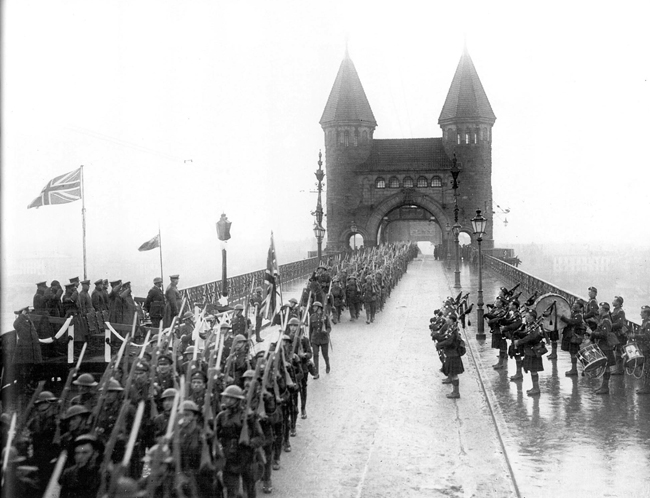
If you’re familiar with Canadian Corps history, you’ll probably know the iconic image of Canadian troops marching into defeated Germany as they salute their commander, General Sir Arthur Currie, in December 1918. The pipe band keeping the troops in step is the 19th, and there stands Archie’s dad, in the ranks, clad in Government Tartan kilt and battle dress tunic, rain and sleet pelting down on the troops as the pipers and drummers stand perfectly still, freezing their fingers off for the victorious Canadian jocks. For Archie, the battle honours of Vimy, Passchendaele and the Pursuit to Mons – where Archie’s dad and his brothers-in-arms gave their all – made indelible impressions on the young piper. And it was likely through his father’s wartime experiences and the role he later played as a senior leader in the post-war Argylls that molded Archie’s lifelong commitment to perfection and service to Canada.
Too young to serve in the Second World War, Archie witnessed many of his elder band-mates deploy overseas while he remained at home watching from the sidelines. It’s likely this experience stoked the young man’s desire to serve the Crown when his time arrived.
All through Archie’s retirement after 52 years of service to his country, he referred to himself as “Major Cairns.” This was integral to the persona that lent itself to the legend he became in the piping world. This should not be mistaken for elitism as Archie sprang from the modest folk of Hamilton, Ontario, where hard-work, self-discipline and perseverance was the gospel practiced, preached and revered. Archie was a product of an army whose cultural values he took on board as a young man and remained with him for life. This was second nature for Archie but could often cause those less familiar with the man to feel some discomfort in his presence.
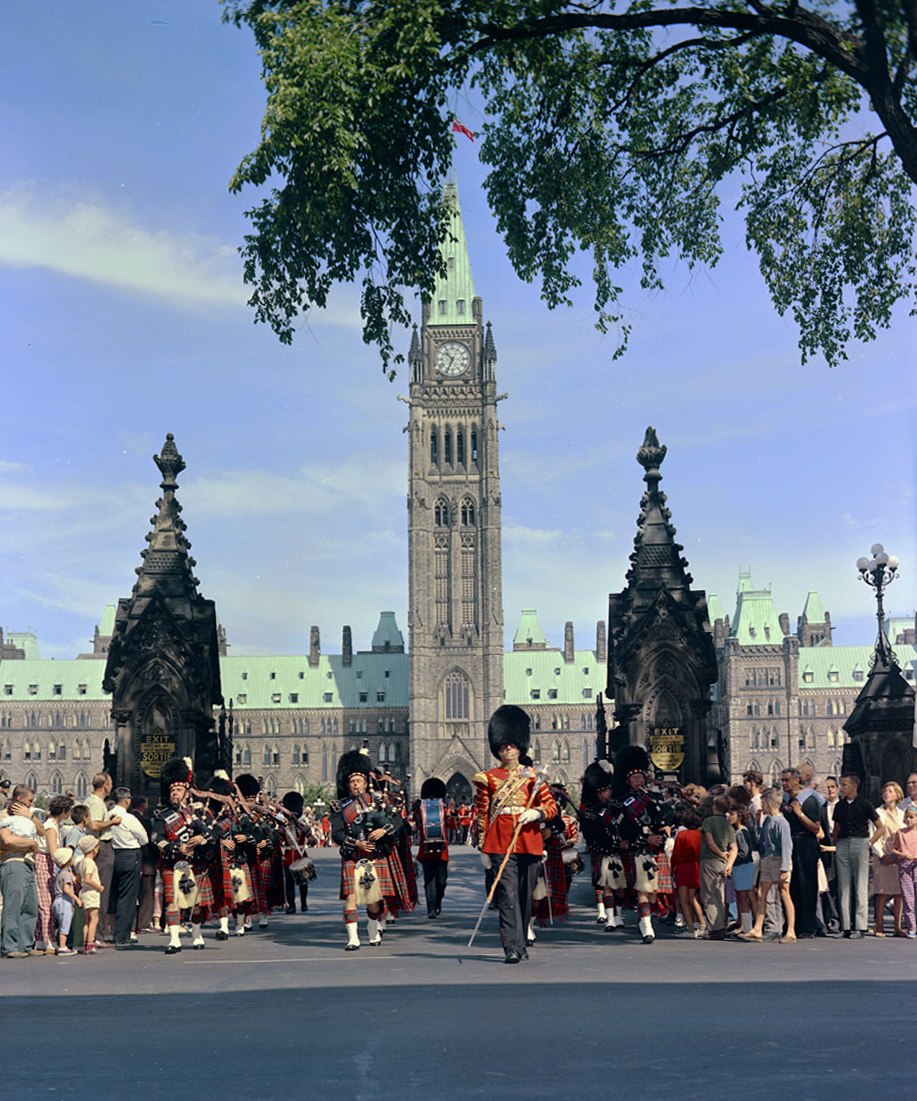
Part of Archie’s genius lay in his pedantry. Thousands of students who enrolled in his summer army cadet camps in the 1980s and 1990s will attest to this. But his gifts in music performance were equally prodigious. As a young boy, he was a singer in vaudeville companies touring theatres in rural Southern-Ontario. One of the groups he sang with were called “The Tartanators,” and Archie happily recounted his time belting out jaunty Scots folk melodies as a young lad in the 1930s and 1940s.
When I spoke with my good friend John-Hugh MacDonald, a former pupil of Archie and professional competitive piper, John-Hugh recounted Archie as a sober disciplinarian who occasionally indulged a fun-loving side to his personality. “I remember Archie coming to my parents’ house for dinner in Ottawa in the late 1970s and he sat and played at our family piano, singing songs. I was mesmerized. I had no idea this side of him existed. He played one song after another and for almost an hour captivated us with a huge hidden musical talent.”
Archie’s vaudeville beginnings couldn’t be repressed.
Yet he only chose to reveal this side with those he kept close to his heart. And although his formal and occasionally gruff exterior is how he will most likely be remembered in our community, those who knew Archie for who he truly was – the fun-loving piano singing piper armed with a large repertoire of Harry Lauder tunes – he was a sensitive, kind and generous man whose humanity was well-known by those decidedly few he permitted himself to be up-close and personal with. He was a true “Highland-gentleman” cut from a bolt of the old cloth and he would welcome this compliment.
But it was the call of the bagpipe and his father’s regiment at the James Street Armoury in Hamilton, Ontario, that honed and developed Archie’s discipline with the instrument and in music writ-large. His musicianship on the boards in the late 1930s and 1940s was undisputed. Later, the combination of his performance gifts and self-discipline combined with his in-depth studies of music theory would prove to be a potent force contributing to the thoroughness and attention to detail characterizing his publications.
Archie’s competitive cohort from those early days included transplanted Scots piper Norman MacPhearson along with locals Duncan Ross, Bobby Jamieson, Doug MacFarlane and “Bus ” Featherstone. Ross, Jamieson, MacFarlane and Featherstone were all front rank pipers in the Argylls, and Archie spoke with admiration about their abilities.
One of his fondest memories was winning the Lieutenant-Colonel William Hendrie Gold Medal for piobaireachd at the annual Highland games in Hamilton. The medal was awarded for outstanding performance and Archie was the recipient in 1948 playing “The MacNabs’ Salute.” He won the clasp to the medal the following year. The medal and its pursuit at the time was, according to Archie, the premier competition of its day in Ontario but by the late 1950s when the games ceased to exist, so too did the medal and, with it, the disappearance of its storied roll-call of recipients. Archie, to a large extent, based his idea for the Piobaireachd Society Gold Medal (Canada) – now held annually at the North American Pipe Band Championships in Maxville, Ontario – on his experiences competing for the Hendrie prize.
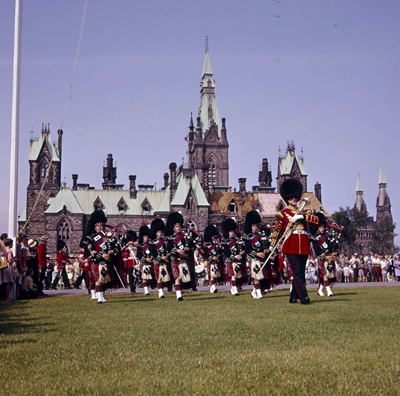
In 1954, Archie’s competitive run took an 11-year break when he transferred to the regular army as a sergeant pipe-major of the 2nd Battalion Canadian Guards at age 26. He went from being the pipe-major of his father’s regiment in Hamilton, where he led an ‘A’ Class level band (today’s Grade 1), to reporting to Camp Petawawa, two hours west of Ottawa where he was welcomed to the band room by 19 brass bugles, a set of rope tension drums and one bass drummer standing at 6’5″ tall. His mission was to build a band. Pipe-Major Cairns had his work cut out for him, but the young maestro was up to the task.
Cairns took the Guards from being a black hole of music to a parade-driven hard-playing Grade 1 prize-winning band. His troops marched up and down the cobble stones of Edinburgh Castle in the late 1950s when they were stationed a short distance away in Germany and it was here that he met young ace Seaforth’s piper, Willie Stirling, who shortly thereafter transferred to the Canadian Army to become his pipe-sergeant.
Appearing at hundreds of European and North American tattoos, music festivals, parades and other public duties, Archie occasionally led his band in competition at the Glengarry Highland Games in the 1960s and on one occasion performed without the backing of his drum corps. Archie’s Guards also paraded on the lawns of Parliament Hill for the daily Changing of the Guard Ceremony.
In his final year of service to the Regiment, he was sent to Edinburgh to attend the Pipe-Major’s Course where he gained a Distinguished Pass – and began a 27-year friendship with Captain John MacLellan.
Although Archie’s list of lifetime achievements far outstrips those of us who pace the humbler paths of existence, he found his calling early and was fortunate to belong to an organization permitting his talents to flourish. But this too Archie recognized early on driving him to devote his life to the promotion and development of music education in those with whom he was charged with leading. The Canadian Armed Forces acknowledged this devotion when, in 1974, he was invested in the Order of Military Merit, the military’s highest decoration for the most conspicuous merit in one’s field. He also blazed the trail for future generations to follow full-time military careers as professional pipe-majors and leading-drummers in positions he fought to have established.
“I believe he felt he was blessed with life and had the impulse to return his good fortune,” said long time student and piper Gilbert Young. “This was also his reason for adopting children in need such as Tara and Michael.” (Later in life, Archie adopted children who were cognitively challenged, providing them with a caring and loving home where he and daughter Fiona devoted their considerable energies).
“His compositions reflect his high regard for his family,” Young continued. “‘Pipe-Major J.K. Cairns,’ ‘Mrs. Joy Cairns,’ ‘Fiona Cairns,’ ‘I’ll Remember Tara’ and ‘Michael’s Peeps’ were all devoted to his immediate family. But, he never forgot his friends, either. Jack Gauthier and I were fortunate to have tunes composed for us among many others.”
Life’s imperfections didn’t pass Archie by as friends and family close to him can attest. His Calvinistic and somewhat dogmatic approach cast many would-be disciples aside. This in no way diminishes the man’s life work but humanizes the super-human qualities that Archie’s devoted following hold him and will continue to remember him.
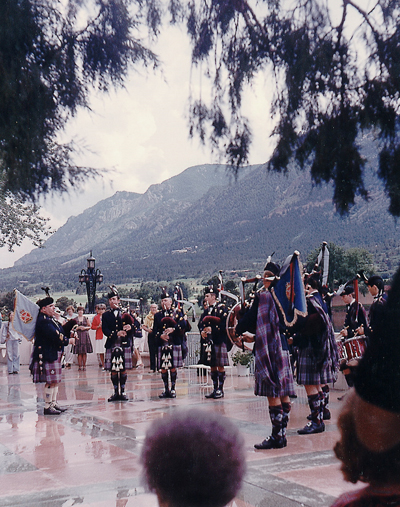
Archie held himself to a high standard. As John-Hugh MacDonald said, “He was a man who never switched-off; he was always on and never allowed himself to stand easy. One former senior military commander referred to what he called ‘The Archie Cairns School of Doing Things Right.'” This was the reason he was so highly sought after in a consultative role, coordinating various events at an early age such as the 1955 Salute to the Tartan Tattoo at the Canadian National Exhibition, the Canadian Tattoo at the 1962 Seattle World’s Fair, the 1967 Centennial Tattoo that crossed Canada, and his leading role in the 1981 Edinburgh Military Tattoo, his last official role in the Regular Force.
Although Archie’s father was his primary teacher, we can’t forget that Archie was influenced in attitude and behavior by another significant authority: he was pipe-corporal to Pipe-Major John Wilson of Edinburgh and Toronto. As Archie himself allowed, “Wilson was a very hard task-master as a musician and leader. Absolutely fantastic player, no doubt about it, and he was as hard on himself as those he led.”
“Everything Archie did was driven by the desire to see piping elevated to its proper place as a serious form of music, free of the stereotyping and mockery it received in films and popular culture,” said John-Hugh MacDonald. “His fundamental belief was that for it to be taken seriously, we had to create systems and institutions for serious musical study and foster performance venues at which piping could be heard at its best. Hence, his lifelong commitment to teaching, publishing, and the creation of the piping schools and high level recitals and competitions such as the Piobaireacehd Society Gold Medal (Canada), the Dr. Dan Reid Memorial, the Vancouver Island Pipers’ Club.”
All germinated inside Archie’s fertile brain and his list of accomplishments is virtually endless.
But in retrospect, Archie himself should have the parting words:
In the early 1940s, it was probably 1942, I was a young piper competing at the Embro Highland Games and I had a problem with my pipes. I didn’t know what to do. I approached an older Scots piper in the Open competition who had just finished playing and asked him for help. This fellow mumbled some derisive comment, grabbed my pipes and took the drone out of the stock. Suddenly he turned his back to me and began to fix the problem. He handed back my pipes and walked away without saying a word. To this very day, I have no idea what he did with my reed because he wouldn’t let me see what he was doing, but it worked. I vowed from that day on that if I ever reached the position where I became an instructor, I would never hold back on any of the lessons I ever learned; I would teach as many people as I could about all the information I knew about music and the pipes.
Archie fulfilled his mission going far beyond his own personal objective. Thousands of pipers and drummers can thank him for more and better music.
Archie Cairns died of an infection at his home in London, Ontario, on April 1, 2016.
Poignantly, this date marks the official formation of the Royal Canadian Air Force, the organization that promoted Archie to the rank of Chief Warrant Officer and appointed him as the first Senior Pipe-Major of the Canadian Armed Forces.
Fraser Clark is a captain in the Royal Canadian Air Force based in Ottawa. For two years, he was the Pipes & Drums Staff Advisor to the Canadian Forces Supervisor of Music. He completed a PhD from the School of Scottish Studies at the University of Edinburgh and a post-doctoral fellowship at the International Center for Jefferson Studies at the University of Virginia. He is the current director of the massed pipes and drums of the Virginia International Tattoo.

NO COMMENTS YET